July, 14, 2024
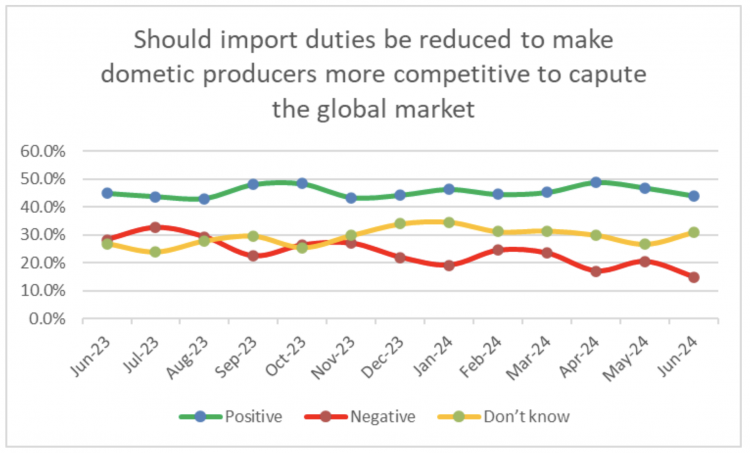
Perceived Economic Opportunity Index [PEOI] 2024 Q2: April 01 to June 30, 2024
This is what we said at the end of 2024 Q1: “Hope continues to elude Sri Lankans despite a few downward adjustments in prices due to the strengthening currency. The only bright spot is that the perception of fighting corruption has increased marginally with the jailing of a cabinet minister. By and large the data suggests Sri Lankans are quite desperate. A glance at the data from the last almost thirteen years suggest that it would be at the next election that the people will have an opportunity to revive their hope.” The perceptions however seem to have become slightly positive with the economic situation getting more stable and inflation easing to some level along with the expectation of the presidential elections before the middle of October. However the desperation of the masses continues to linger on as reflected in the data.
The Foundation of Economic Freedom in Sri Lanka (FEFSL) presents here a summary of perceptions of the people of Sri Lanka about their own and the nations’ future as at the end of the second quarter of 2024. Started in July 2011, this forward-looking nation-wide tracking study, conducted monthly and reported quarterly, is based on a set of questions and answers developed by FEFSL to measure the mood of the people of Sri Lanka on their perceived opportunities into the future.
1.0 Methodology
The PEOI is calculated based 2024 Q1 on monthly data collected by PepperCube Consultants on an island-wide random survey of face-to-face interviews among 1,000 persons (The sample was increased from 500 to 1,000 from January 2024). Surveys for this assessment were conducted from 01 to 30 April; from 01 to 31 May and from 01 to 30 June, 2024. This quarterly report is therefore based on a total survey of 3,012 persons in three months and provides an ongoing commentary on how Sri Lankans feel about their economic future at this moment and the next twelve months. It also provides the reader with the ability to compare this sentiment since July 2011.
2.0 Presentation of specific findings
As always, monthly survey data is analyzed and presented quarterly. The focus is on perception of economic opportunity. Perceptions of one’s ability to save and of corruption are also regularly presented. Further, the survey tracks perceptions on cost of living, development of the country, media freedom and law and order among others. A selected assessment on one of these questions is reported periodically. This quarter we consider the perceptions on global integration.
2.1 What will happen to my opportunities at work or in my business?
The question posed to the respondents is whether they believe their economic opportunities, be it in the workplace or in their business, would increase, stay the same, or diminish in the year ahead.
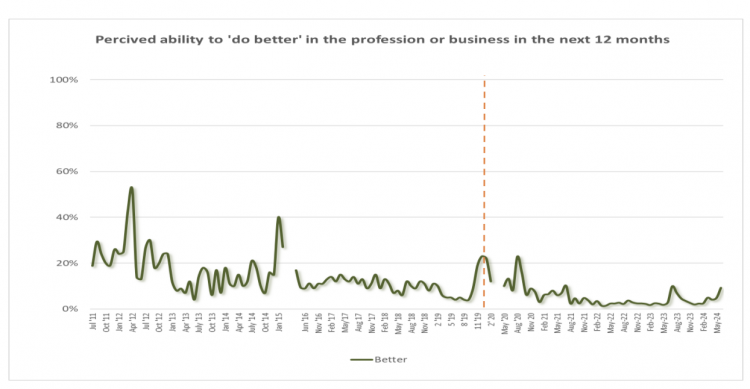
Optimism fell to its lowest in mid-2022 to a mere 1.4 percent as Sri Lanka defaulted on its external debt for the first time but picked up to 3.7 percent in September that year with a glimmer of hope with the announcement that Sri Lanka had reached a Staff Level Agreement (SLA) the International Monetary Fund (IMF) to receive a bail-out package to climb out of debt. With the IMF funds getting delayed, optimism fell again to 2.4 percent by the end of 2022. But as the IMF Board disbursed the first tranche and all major creditor nations agreed to restructure Sri Lanka’s debt, the sentiment improved with perception of a better tomorrow moving up a tad bit to 2.5 percent at the end of the first quarter 2023. People’s optimism about their own success fluctuated slightly and ended the second quarter at 2.8 percent in June 2023. The third quarter saw much better results with the finalization of the domestic debt restructuring and the introduction of the Aswesuma social safety net program. Having increased to 9.9 percent, the highest reading since the crisis, optimism fell to 4.6 percent at the end of the quarter. The fourth quarter of 2023 was a disaster. Those who thought they had a chance of advancing in the profession or business, essentially their economic opportunity ending up at a mere 1.9% in December. Then optimism rose to 4.9 percent in March; the highest figure since September 2023 perhaps reflecting the positive news around the IMF review, the reduction of electricity tariffs between 18 to 24 percent and the fall in prices of imported goods with the currency strengthening to LKR 300 to the USD from LKR 325 at the end of 2023. The second quarter was noticeably better. Even though it fell to 4.0 percent in April, optimism picked up to 4.8 percent in May and almost doubled to 9.3 percent by June 2024 indicating a sense of emerging hope. This is significant because this figure was only surpassed once, that too marginally in July 2023, since July 2021.
Looking at the historical trends the unfortunate reality is that Sri Lankans have continued to lose hope in their future over the last decade or so. The two markers are when optimism rose was with the change of government in January 2015 and once again with the change of government in November 2019. Now the unofficial campaign is in full swing with the various candidates promising a brighter future. The question is, will the new President, if there is a change, be willing to continue the reform process that took the nation out of the utterly hopeless situation it was in? These questions will only be answered later in the year but the data suggests hope is building for a positive change.
2.2 How much can I save?
Here our objective is to determine the perceptions on the ability to save. This is also a way to estimate the cost of living. The cost of living is the combination of expenses and the income one receives to maintain a certain lifestyle. This obviously changes from low-income households to middle and high ones.
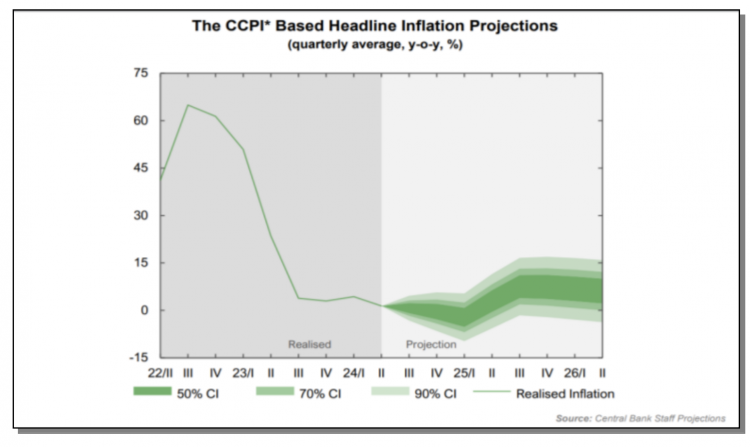
In terms of expenses, and as seen in the Central Bank of Sri Lanka (CBSL) actual and projected inflation chart as at the end of the second quarter 2024, inflation, or rate at which expenses were increasing, began to fall rapidly since the unprecedented high of 65 percent to under 2.0 percent while projection for the next 12 months remains reasonably low within the 50 percent confidence interval. With the passage of the new Central Bank Act, the government and the CBSL have agreed on a 5.0 percent target for the coming three years.
On the 2024 budget proposed a LKR 10,000 monthly increase in public sector salaries from April of 2024. Half of that amount was paid starting January, and the full increase was paid since April. The government requested the private sector to provide a raise in salary to their employees as well, but only some firms were able to do so. In the worst hit estate sector, plantation workers have been agitating for an increase in their wages, but it has not yet materialized.
To assess the ability to manage the cost of living and to have something left over, we asked the respondents about their expected personal savings in the coming 12 months.
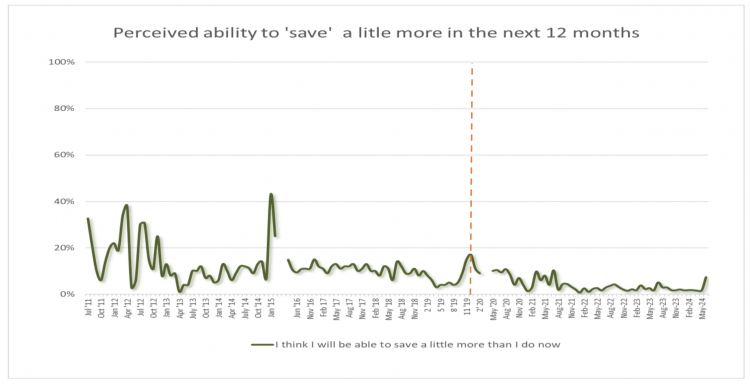
By the end of 2022 those who thought they could save a little more than at present were at a low of 1.4 percent. But as inflation began to fall this perception gradually rose to 3.8 percent by the end of the first quarter 2023 and with inflation falling rapidly it increased to 5.1 percent in July but fell again to 2.9 percent by September 2023 with increasing taxes and utilities. It had fallen to 2.0 percent by end December 2023. Throughout the first quarter of 2024, people’s ability to save little more remained at just 1.7 percent in March. The second quarter started out same at 1.5 percent in April, increasing to 1.6 percent in May and shooting up to 7.3 percent in June; the highest since July 2021. This is reflective of the optimism we saw in the previous chart.
Once again, while the general perceptions are indicative of the desperation of the people have become, there seem to be some hope emerging.
2.4 Will corruption be reduced?
The question posed is if the respondents perceive that corruption will lessen in the coming 12 months. It is quite clear that people of Sri Lanka seem to have lost hope in attacking corruption. It is significant that post the change of the presidency in 2019 and the parliament in 2020 hope rose but soon it fell.
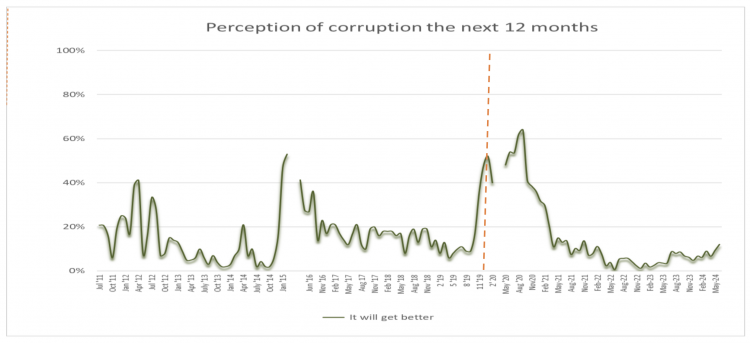
The perception of reducing corruption rose to 8.6 percent at the end of third quarter 2023. This was very likely the result of government and opposition coming together to agree on legislation on the new anti-corruption Act in line with global best practices. However, that sentiment had reduced somewhat with the figure falling to 4.8 percent by end of the fourth quarter but rose again during the first quarter 2024 due most likely due to the arrest of a sitting cabinet minister; Keheliya Rambukwella on charges of misappropriation in procuring medicines and medical equipment during the crisis. To this date he remains in remand custody as his many cases are being heard. As with the previous improvements in sentiment, the perception on fighting corruption also improved. In April it started at 6.7 percent. It improved to 9.4 percent in April and to 12.1 percent in June. This is a positive sign.
2.5 A Question on Global Integration
Besides the questions we ask respondents monthly to establish trends, we also seek to understand how people react to current issues. Given the lack of hope in the economic conditions and the need to reverse this trend, there are two schools of thought developing in the current discourse. One is a more insular structure where domestic players are protected with high import tariffs and other levies, duties, and quantitative restrictions. This is relevant because what seem to be a large section of society is of the view that it was the liberalization of the late 1970s that created an ‘open economy’, even the factually incorrect as many restrictions remained, that caused the economic crisis of Sri Lanka by ‘killing off’ domestic industry and ‘privatizing’ state owned enterprises. A smaller group is to open the country and integrate with the world. This calls for trade reform including lowering of tariffs and forcing domestic producers to compete with regional and global manufacturers.

The responses continue to be unexpected with those agreeing between 40 to 50 percent to be more than those disagreeing between 30 and 10 percent with a fair number saying they are unable to comment. We plan to monitor this trend to assess if this thinking will be sustained.
3.0 Concluding Thoughts
People of Sri Lanka have not been positive about their future for the last thirteen years since we started measuring optimism except for spurts post elections. The level of hopelessness increased over the last three years as the mismanagement of the economy caused people unprecedented suffering post the pandemic. It is however interesting to note that the second quarter of 2024 ended in a relatively positive note amid the desperation. Optimism increased and did so in significant measure. Whether it is due to the stabilization of the economy or the hope for change with a new President at the elections due at the end of the third quarter is a question that could be answered soon.
The Foundation of Economic Freedom appreciates the generous support by the Friedrich Naumann Foundation for Freedom to undertake this work.
Video Story